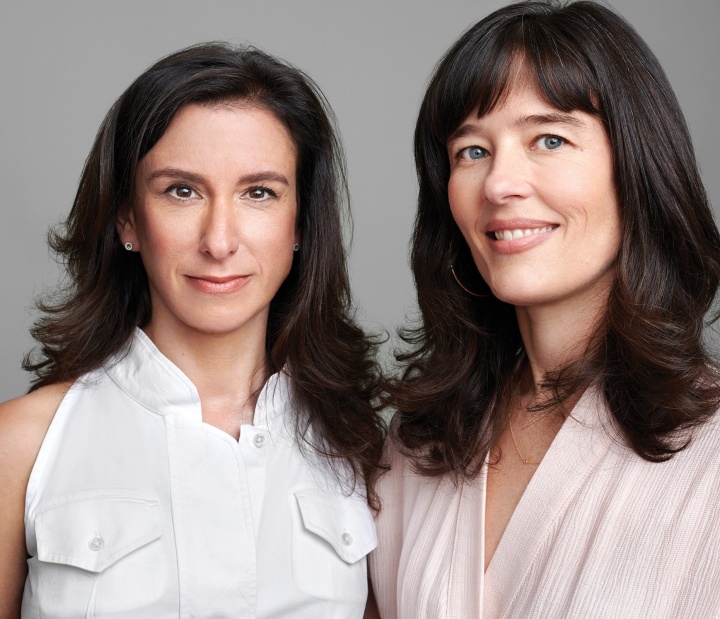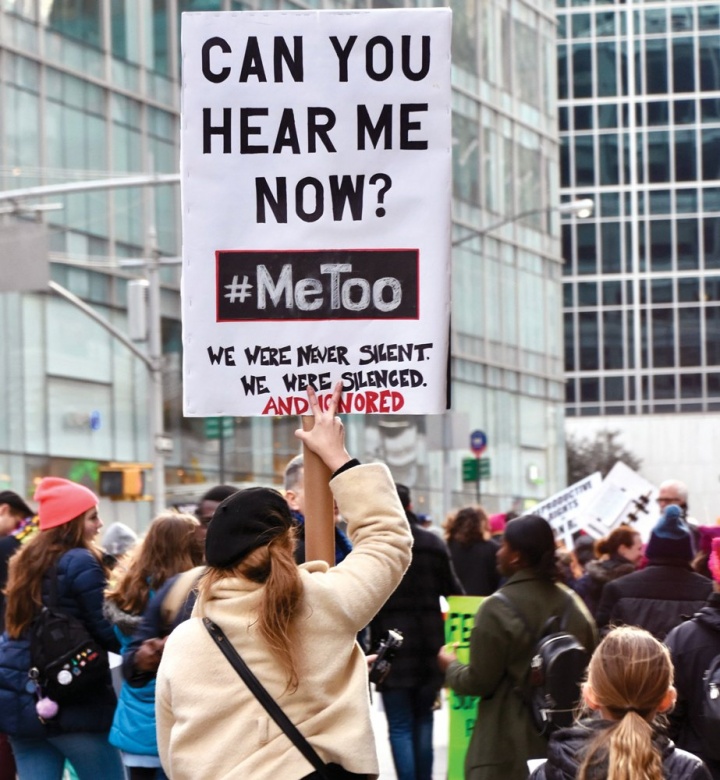How Jodi Kantor ’96 and Megan Twohey blasted open the Weinstein story.
Columbia College | Columbia University in the City of New York
How Jodi Kantor ’96 and Megan Twohey blasted open the Weinstein story.

Jodi Kantor ’96 (left) and Megan Twohey
MARTIN SCHOELLER
Now, with fellow Times writer Megan Twohey, Kantor has written another blockbuster. Their newsroom memoir, She Said: Breaking the Sexual Harassment Story That Helped Ignite a Movement (Penguin Press, $28), has been hailed as the feminist equivalent of The Washington Post’s famous Watergate exposé. (The Los Angeles Times playfully headlined its review “‘She Said’ is more important than ‘All the President’s Men.’ There, I said it.”) A well-matched pair of reporters, Kantor and Twohey seem poised to become the journalistic icons for their generation: Woodward and Bernstein, with a difference.
She Said is the inside story of the New York Times investigation into complaints of sexual misconduct by Miramax Films co-founder Harvey Weinstein; the story, a 3,300-word piece about alleged abuses by Weinstein, was published by the Times on October 5, 2017, and won Kantor and Twohey (along with The New Yorker’s Ronan Farrow) the 2018 Pulitzer Prize for Public Service. After scores of interviews, Kantor and Twohey had managed to substantiate the sinister rumors that had swirled around Weinstein for decades.
The writers tirelessly sought out victims both well known (actresses Ashley Judd and Gwyneth Paltrow contributed to the investigation) and lower profile. They traveled extensively in search of leads and breakthroughs — almost everyone they spoke to was hamstrung by a non-disclosure agreement, by a lucrative settlement or by pure fear of retribution from Weinstein. (Though Kantor claims not to have been afraid, the book describes how Weinstein hired an intelligence agency staffed by ex-Mossad agents to find a way to derail the Times’s reporting efforts.)
After months of hard work, Kantor and Twohey still had not located a female source with a firsthand account of abuse who was entirely sure that she wanted to speak on the record — but then, slowly, the tide turned. They began to find current and former employees who were willing to share inside knowledge and paperwork that would help substantiate the lurid stories Kantor and Twohey had uncovered. Chapter upon chapter of She Said details their meticulous work. The moment when Times executive editor Dean Baquet — “jumping out of his skin” — decides the story is finally ready to print feels seismic.
The results were immediate. A day after the story’s publication, a third of Weinstein’s board had resigned; days later, Weinstein himself was out. His corporation declared bankruptcy within a year. More importantly, the article’s revelations led to a national outpouring of sexual-harassment confessions, helping to reignite the “Me Too” movement activist Tarana Burke had started in 2006. “So many women phoned … to report allegations of sexual harassment and assaults against Weinstein that the paper had to assign additional reporters to handle the calls,” a Times contributor noted. Kantor and Twohey refer to their piece as “a solvent for secrecy, pushing women all over the world to speak up.”
Two years later, reading the book is a euphoric experience. The two reporters are at the top of their game, seamlessly and effectively cooperating and tag-teaming. As feminist author Susan Faludi points out in the Times review, it’s the journalistic equivalent of world-level sports: “Watching Kantor and Twohey pursue their goal while guarding each other’s back is as exhilarating as watching Megan Rapinoe and Crystal Dunn on the pitch.” In the end, what impresses most is Kantor and Twohey’s fearlessness in the face of established power — and the fierce adrenaline that animates them. As Kantor recently admitted to Vox, she and Twohey “kind of relish” having had the chance to confront Weinstein’s wrongdoings. “We’re investigative journalists,” she says firmly. “We’re trained to do this.”

In 2013, Jodi had started investigating women’s experiences at corporations and other institutions. The gender debate in the United States already seemed saturated with feeling: opinion columns, memoirs, expressions of outrage or sisterhood on social media. It needed more exposure of hidden facts. Especially about the workplace. Workers, from the most elite to the lowliest, were often afraid to question their employers. Reporters were not. In doing those stories, Jodi had found that gender was not just a topic, but a kind of investigative entry point. Because women were still outsiders at many organizations, documenting what they experienced meant seeing how power functioned.
She wrote to actress Rose McGowan, calling on those experiences:
Here’s my own track record on these issues: Amazon, Starbucks and Harvard Business School have all changed their policies in response to gender-related problems I exposed. When I wrote about the class gap in breastfeeding — white collar women can pump on the job, lower paid women cannot — readers responded by creating the first-ever mobile lactation suites, now available in 200+ locations across the country.
If you’d rather not speak, I understand and best of luck with your book publication.
Thank you, Jodi
McGowan wrote back within a few hours. She could talk any time before Wednesday.
The call seemed like it could be tricky: McGowan appeared tough, with a buzz cut and that call-to-arms Twitter feed. But the voice on the phone belonged to someone impassioned and game, who had a story and was searching for the right way to tell it. Her tweets about being raped had just been hints, with few details. Generally, the rule in interviews was that they were on the record — meaning the material could be published — unless otherwise discussed. But any woman with an assault complaint against Weinstein would probably be reluctant to have even an initial conversation. So Jodi agreed that the call would be kept private until they decided otherwise, and McGowan started in.
In 1997, she had been young and newly triumphant, on a heady trip to the Sundance Film Festival, where she alternated between premieres and parties and a TV camera crew followed her around. She had only been in four or five films, like the teen-horror flick Scream, but she was becoming one of the ingenues of the moment, with multiple new movies at the festival alone. “I was the belle of Sundance,” she said. Independent films were at the center of the culture, the festival was the place to be, and Harvey Weinstein was sovereign: That was where the producer-distributor had bought small films like Clerks and Reservoir Dogs, which he had turned into cultural touchstones. In her telling, McGowan didn’t remember which year this was; many actresses chronicled the past not according to date but instead to which movie of theirs was filming or being released at the time. McGowan recalled the screening where she had sat right near Weinstein:
The movie was called Going All the Way, she said with an incredulous laugh.
Afterward, he had asked for a meeting with her, which made sense: The top producer wanted to get together with the rising star. She went to see him at the Stein Eriksen Lodge Deer Valley, in Park City, where they met in his room. Nothing happened except the usual talk about films and roles, she said.
But on the way out, Weinstein pulled her into a room with a hot tub, stripped her on the edge, and forced his face between her legs, according to McGowan. She said she remembered feeling like she was leaving her body, floating up to the ceiling and observing the scene from above. “I was just feeling massive shock, I was going into survival mode,” she said. To get away, McGowan said, she faked an orgasm and mentally gave herself step-by-step instructions: “Turn the door handle.” “Walk out of this meeting.”
Within a few days, she said, Weinstein had left a message on her home phone in Los Angeles with a creepy offer: Other big female stars were his special friends, and she could join his club as well. Shocked and distraught, McGowan had complained to her managers, hired a lawyer, and ended up with a $100,000 settlement from Weinstein — essentially, a payment to make the matter go away, without any admission of wrongdoing on his part — which she said she had donated to a rape crisis center.
Did she have her records from the settlement? “They never gave me a copy,” she said.

Kantor and Twohey’s blockbuster story helped reignite the “Me Too” movement that was started in 2006, leading to women all over the world speaking out against sexual harassment.
Alec Perkins / Flickr
The problem was worse than Weinstein, she said. Hollywood was an organized system for abusing women. It lured them with promises of fame, turned them into highly profitable products, treated their bodies as property, required them to look perfect, and then discarded them. On the call, her indictments came fast, one after another:
“Weinstein — it’s not just him, it’s an entire machine, supply chain.”
“No oversight, no fear.”
“Each studio does the victim shaming and payouts.”
“Almost everyone has an NDA.”
“If white men could have a playground, this would be it.”
“The women here are just as guilty.”
“Don’t step out of line; you can be replaced.”
McGowan’s words were arresting. It wasn’t new to say that Hollywood took advantage of women, forced them into conformity, and dumped them when they aged or rebelled. But hearing a direct account of exploitation from a familiar face, in full disturbing detail, and with one of the most renowned producers in Hollywood as the perpetrator, was entirely different: sharper, more specific, sickening.
From the book SHE SAID: Breaking the Sexual Harassment Story That Helped Ignite a Movement by Jodi Kantor and Megan Twohey. Reprinted by arrangement with Penguin Press, a member of Penguin Group (USA) LLC, A Penguin Random House Company. Copyright © Jodi Kantor and Megan Twohey, 2019.

Published three times a year by Columbia College for alumni, students, faculty, parents and friends.
Columbia Alumni Center
622 W. 113th St., MC 4530, 6th Fl.
New York, NY 10025
212-851-7852
cct@columbia.edu

Columbia Alumni Center
622 W. 113th St., MC 4530, 4th Fl.
New York, NY 10025
212-851-7488
ccalumni@columbia.edu